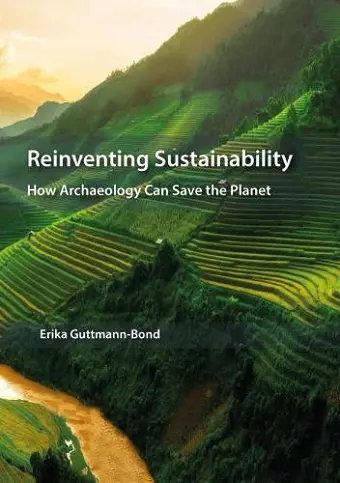Reinventing Sustainability
How Archaeology Can Save the Planet
Format:Paperback
Publisher:Oxbow Books
Published:31st Jan '19
Should be back in stock very soon

There have been many books written about what we can learn from the failures of the past, but I want to take a more optimistic view, focussing on what we have to learn from past successes.
This book is about sustainable agriculture and architecture in the past, and the engineering works that supported them, but it also looks to the future. Ancient technologies are what engineers define as ‘intermediate’, which means that they are often simple, low in cost and they depend on local materials. Significantly, they don’t require fossil fuels. There is a lot that we in the West can learn from the past and from developing countries where people still practice traditional agriculture, and there is now broad agreement among many governments, non-government organisations, engineers and agronomists, as well as the United Nations, that intermediate technologies are often the most appropriate way forward in developing countries. The New Green Revolution is looking to traditional knowledge to solve problems of decreasing yields and environmental impoverishment, rather than to technology that is dependent on the diminishing resource of fossil fuels.
This subject is controversial and I have been accused of suggesting ‘pie in the sky’ ideas, but the re-introductions I’m suggesting are already being carried out in countries all over the world. Water harvesting and other dryland systems are being re-introduced in Egypt, Iraq, Jordan, Libya, Morocco, Pakistan, Syria, Tunisia, Yemen, Afghanistan and Oman. Other early technologies are being put back to work in Peru, Bolivia, India, Bangladesh, Niger, Burkina Faso and many more. I would like to raise awareness of the fact that we already have the technology to make sweeping improvements to the way that we grow food and manage the environment; we could be producing more food per hectare, and we could be doing it more sustainably. I introduce many case studies of successful reintroductions that demonstrate how this can be done. These studies demonstrate that sustainable agriculture is often not only cheaper than industrialised agriculture, but it is also more productive per hectare. As the climate changes, it is imperative that we come up with new ways of managing our environment. Deserts are spreading, wetlands will expand as the sea level rises, and we need to find ways to...
Promising to be an optimistic book, 'Reinventing Sustainability' looks at examples of successful sustainability in the past and considers whether these could be reintroduced; it does not disappoint. * Antiquity *
Reinventing Sustainability is a vibrant, fascinating, and above all optimistic exploration of past successes in human relationships with local environments […] The book is richly illustrated and accessibly written, introducing the reader to the key disciplines of archaeology and anthropology in a way which is understandable for the non-specialist. * Agricultural History Review *
“Reinventing Sustainability” provides a ray of optimism at a time when our environmental discourse has become mired in doomist prophecy. Archaeologist Erika Guttmann-Bond paints a portrait of a sustainable future that is still within reach, teaching us lessons from the successful practices of past cultures and how we might incorporate them into our modern technological infrastructure. Read this book and be empowered to help change the world. * Michael Mann, Distinguished Professor, Penn State University and author of The Hockey Stick and the Climate Wars and The Madhouse Effect *
…a very good introduction to the subject of sustainable agriculture, covering a wide range of practices and supported with fascinating case studies. While the range of material and the geographical span of case studies means that there is probably something to be gained by every reader, the brevity of the book leaves the reader wanting more. * Archaeological Journal *
Archaeology may sometimes be consdered irrelevant to the future but this book shows how erroneous this view is… Well-written and easy to read, this book is deeply relevant for our time, with examples that give us all hope for the future. * Current World Archaeology *
ISBN: 9781785709920
Dimensions: unknown
Weight: unknown
192 pages